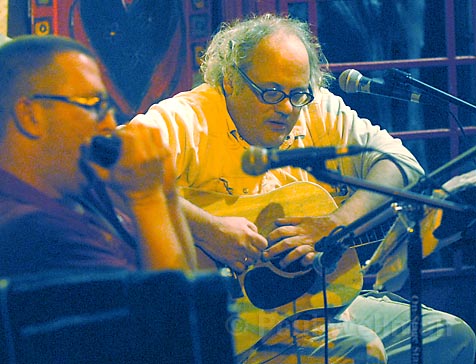Eugene Chadbourne, with Bill Barrett and the Colter Frazier/Rob Wallace Duo.
At Reds, Thursday, December 6.

Colter Frazier’s Experimental Music Nights continued this month with a visit from free improvisational guitarist, avant-garde comedian, and all-around musical archivist/political activist Eugene Chadbourne. Accompanied by Los Angeles-based harmonica master Bill Barrett, Chadbourne laid down a charming and consistent set of originals and covers interspersed with discrete episodes of squealing sonic mayhem. Given that this music makes no concessions, it’s remarkably listenable and swinging. How does this man get birdcalls and nail scratches to sound so musical? The answer is partly Chadbourne’s propulsive sense of time. Rhythmic buoyancy allows him to pull off Steppenwolf’s “Magic Carpet Ride” with nothing but a banjo and a harmonica. Swing also goes a long way toward redeeming Chadbourne’s voice, which somehow, despite certain limitations, still satisfies like good singing.
Colter Frazier and Rob Wallace played immediately before Chadbourne in their tenor sax and percussion configuration. Frazier and Wallace achieve a remarkably mature idiom in this format, easily holding up to mental comparison with benchmark free jazz duos like John Coltrane and Rashied Ali or Jimmy Lyons and Andrew Cyrille. There’s a broad musical range, a strong feeling of continuous improvisational engagement, and just enough theatricality to keep things jauntily fractured, as when Wallace made an improvisational cell phone call.
Chadbourne’s first number was an original called “Cheney’s Hunting Ducks” that ran humble comic roughshod over our executive branch and its war-making ways. Politics have always been a part of the Chadbourne mix, and his stylized madcap outrage holds up well in this era of news via The Daily Show. Each of his explicitly political, original songs took a different angle on the war. “The Girl from Al Qaeda” (set to the tune of you-know-what Brazilian standard) was punctuated with vocalized explosions and ended when the narrator lost his eyesight to IED shrapnel. “How You Gonna Re-up When You’re FUBAR?” shed light on something even hyper-patriotic vets must confront-the fact that war often destroys those who fight it.
The spirited improvs were well-timed and brilliantly executed. It is one thing to have a distinctive tone when playing a melody on a tuned musical instrument, and quite another to get something that others recognize as “your sound” out of rattling keys. Chadbourne and Barrett both belong to this odd, endearing elite of experts in the art of noise.



